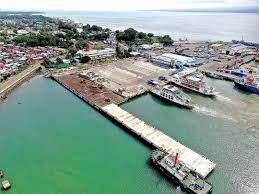
PHILIPPINE trade groups are pushing for the revival of plans to establish the Roll-on, Roll-off (RO-RO) shipping network in the Association of Southeast Asian Nation (Asean) region, saying such could reduce logistics costs among countries in the region.
At the 21st International CEO Conference organized by the Management Association of the Philippines (MAP) on Tuesday, Philippine Chamber of Commerce and Industry (PCCI) President George T. Barcelon, along with heads of business chambers of Asean member-countries particularly from Thailand and Singapore, discussed major initiatives of Asean member nations in enhancing the business climate in the region.
Through the Philippine trade’s lens, Barcelon said “one area that should be looked into moving forward is the roll-on, roll-off logistics.” He said this logistics program would reduce logistics costs among countries in Asean.
For the Philippines, he said, Mindanao—the food basket of the country—will benefit from this logistics program as the southern region can export some of its agricultural produce to Asean neighbors.
Barcelon underscored the importance of this logistics system for Philippine trade, explaining that “anything that is transported by sea is much cheaper.”
The 2013 Asean master plan and feasibility study on the establishment of an Asean RO-RO Shipping Network and Short Sea Shipping defined a “roll on-roll off ship” as “a passenger ship with ro-ro cargo spaces or special category spaces.”
It defined ro-ro cargo spaces as “a space in which goods, in or on rail or road cars, vehicles, trailers, containers, etc. are loaded and unloaded.”
Barcelon said the “uniqueness” of this logistics system in the Brunei, Indonesia, Malaysia, Philippines-East Asean Growth Area (BIMP-Eaga) is growing.
The PCCI chief said if the agriculture sector in Mindanao is “properly developed,” then “We will have enough produce to export. And exporting to neighbors Malaysia and Thailand, all of this will be cost-effective on the roll on, roll off.”
“It’s something that was started but was not given focus. I hope that when we talk about the centrality of Asean na dapat yung mga complementary because we are actually competing. We’re competing [in] manufacturing,” Barcelon told reporters on the sidelines of the 21st International CEO Conference held on Tuesday in Taguig City.
The PCCI head recalled that in 2017, then President Rodrigo R. Duterte and Indonesian President Joko Widodo launched the Davao-GenSan-Bitung shipping route but it was not given much “focus” that time.
With this, Barcelon said, “Now that we’re opening up and having this Asean meeting, I’m really just going back from where we left off [and I hope] we can push it forward.”
For his part, Sergio R. Ortiz-Luis Jr., president of the Philippine Exporters Confederation Inc. (Philexport), told reporters they have been pushing for the RO-RO logistics system because the Philippines is an archipelago.
“We need to revive it because we cannot build bridges everywhere. RO-RO is the most practical way for us… ,” the Philexport chief said.
This logistics initiative will “definitely” boost the country’s exports, he added. “Well, definitely, because it’s the supply chain. Delivery especially in Mindanao and the Visayas [is hard], especially for agriculture products so RO-RO is the cheapest way for them to do it.”
Meanwhile, in the same event, MAP inked a Memorandum of Partnership and Cooperation (MPC) with Singapore International Chamber of Commerce and Thailand Management Association (TMA) to share “best management practices to promote management excellence,” among others.
The partnership is also meant to come up with Education, Information and Communication activities that enhance the knowledge and skills of management practitioners and educators.
The three business groups in Asean also aim to advocate for reforms to help improve the ease of doing business in the region.
